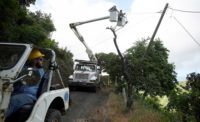Puerto Rico’s electric grid would be divided into eight minigrids that could run independently of one another in the event of a hurricane or other natural disaster. The minigrids would each have solar panels, battery storage and some natural gas and could contain separate microgrids. Fully independent microgrids would power more isolated areas of the island, under a draft integrated resource plan, submitted Feb. 12 by the Puerto Rico Electric Power Authority.
The 20-year plan calls for about $5.6 billion in capital investments, mainly for up to 1,200 MW of solar power and 1,100 MW of battery storage, much of it within the first four years of the plan. Additionally, about 18 23MW small natural gas plants would be installed throughout the island to provide power in the event of another catastrophic hit to the electric grid, such as 2016’s Hurricane Maria that left the island without electricity.
The island’s existing grid is particularly vulnerable to hurricanes and high winds because most of the power generation is on the south end of the island and must be carried over the island’s mountainous center to larger cities on the north side of the island.
The proposal, which must be vetted by the Puerto Rico Energy Commission, also calls for two to three ship-based liquefied natural gas plants to power the natural gas plants on the island, including two larger natural gas power plants that would remain in service. A law approved last year calls for privatizing the assets of the grid so new generating assets would be financed by third parties.
Stephen Spears, president of the Puerto Rico chapter of the Associated General Contractors, said that after a decade, Prepa’s administration has “thrown the door open after having it heavily bolted shut,” including allowing industry to produce its own power.
“There are aggressive time frames for all of these things,” Spears says. I will be greatly surprised if they all happen. But some will definitely happen.” Spears adds that the bankrupt government is ultimately at the mercy of the U.S. Congress and President Trump.





Post a comment to this article
Report Abusive Comment